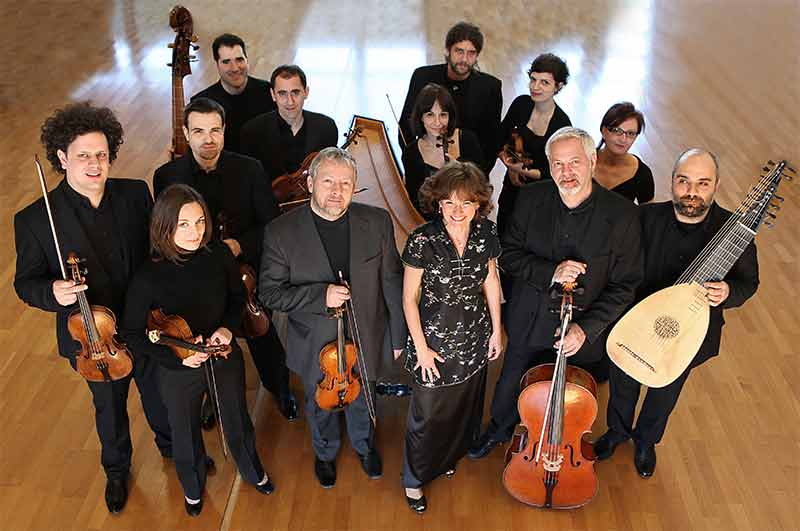Europa Galante brings Vivaldi and friends to life at Library of Congress

Europa Galante performed Friday night at the Library of Congress. Photo: Ana de Labra
Europa Galante’s sizzling recordings have brought a number of unknown operas and orchestral works to inquisitive listeners. The Italian group’s live performances, most recently at Shriver Hall in 2016, are generally not at the same level of technically polished achievement, but add an element of visceral excitement that can be lacking on disc. A thrilling concert Friday night at the Library of Congress, a decade after its last visit there, was in the same category.
Founded by Fabio Biondi in 1990, Europa Galante was one of the leaders of the second generation of early music ensembles. This program, based on a selection of relatively late concertos by Vivaldi, drew from the group’s two most recent recordings for the Glossa label.
The sound was fast and taut in the outer movements of Vivaldi’s Sinfonia in G major (“Il coro delle muse”), with characteristic placement of weight-shaping phrases under Biondi’s leadership. The suave second movement, for two solo violins accompanied only by pizzicato strings, was an example of how varied use of the continuo instruments can relieve the monotony of this kind of one-trick programming.
Ending the program were two extraordinary concertos from the “Concerti dell’addio,” composed by Vivaldi after an ill-fated trip to Vienna, where he died in poverty. In the Violin Concerto in C major, RV 189, Biondi was at his daredevil best in the brash and breathless fast movements. In his hands for this concert was a 1730 Guarnerius violin once owned by Fritz Kreisler and now in the collection of the Library of Congress. In the gorgeous, mostly violins-only slow movement–again without the percussive interference of the harpsichord–one most sensed the spirit of Kreisler looking down.
Biondi launched more pyrotechnics in the Violin Concerto in B-Flat Major, RV 371, with an especially dazzling cadenza added to the slow movement, featuring delicate left-hand pizzicati. In the active finale, the entire continuo section—especially harpsichordist Paola Poncet and theorbist Giangiacomo Pinardi—added a wildly strumming rhythmic backdrop.
The other highlight was the Flute Concerto in D Major by Ignaz Holzbauer, one of the Germanic composers influenced by Vivaldi. Marcello Gatti’s mellow, precise playing on the wooden transverse flute provided a welcome new flavor on this otherwise strings-only concert. Biondi kept the string playing bright and cutting in the orchestral introductions but reduced the sound to render a pale envelope of sound around his soloist. By the third movement of often dull repetitions, though, the impression of a decidedly inferior composer had set in.
Georg Reutter’s Sinfonia in D Minor and Baldassare Galuppi’s Overture to the opera Adriano in Siria both had a similar effect, lesser works mostly providing an opportunity for the ensemble’s well-drilled precision, arrayed in a wide range of energetic articulations, to shine.
Regrettable among the changes from the announced program was the jettisoning of the Violin Concerto in A Major (“Con eco in lontana”), with its delightful echo effects. Biondi instead took the solo part in the Violin Concerto in D Major (“Per la Signora Chiara”), here with some shortcomings in intonation and note accuracy in the vibrant first movement. The slow movement, however, was ravishing, with Biondi’s tender, forlorn solo supported by soft strings and theorbo, the latter with pleasing embellishments.
Replacing Johann Georg Reinhardt’s Concerto for Four Violins was the much more familiar Concerto for Two Violins, RV 522, by Vivaldi. Violinist Andrea Rognoni kept pace with Biondi, a pairing that highlighted the sometimes raw, less refined sound of his director. The two wove together aching suspensions in the slow movement, adding diverting ornamentation over a repeated bass pattern.
It is perhaps a cliche by now to end this sort of program with the searing storm finale of Vivaldi’s “Summer” Concerto. Biondi and his colleagues yet again made the piece sound new with a blazing, fierce performance that struck like hailstones.
The next concert at the Library of Congress will feature chamber music by Hummel and Beethoven, performed by members of the Royal Concertgebouw Orchestra from Amsterdam 8 p.m. January 19. loc.gov/concerts

Posted Jan 20, 2018 at 6:14 pm by Laura Youens
What a vivid review!